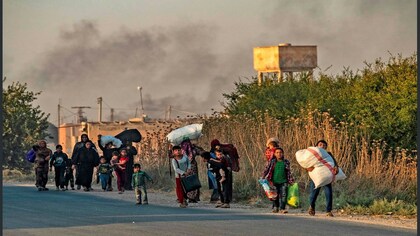Iran feels the squeeze
20:25 - 8 January 2012

Several clocks are simultaneously ticking in the Middle East. We can still dare to hope for a last-minute miracle - and we can be certain that there are plenty of well-intentioned people working tirelessly behind the scenes to produce one.
Truly, the gloomiest moments are often also the moments of greatest opportunity, for war drums drown out the noise of secret negotiations, and when the hawks are occupied, the doves get just a moment of opportunity to fly free.
Yet it is not easy to be hopeful. Policy analysis often uses historical paradigms to evaluate the course of international crises, and while indeed there are examples of the above pattern in history (the end of apartheid in South Africa comes to mind, as well as that of numerous low-intensity conflicts from the past few decades), there are also some very worrying counter-examples.
Fiery rhetoric carries inertia of its own, and massive arms build-ups - such as we have witnessed in the Middle East in the past years, months and weeks - cannot be sustained for very long. This produces a sense of urgency. If a breakthrough in negotiations fails to materialize, the likelihood of an explosion of violence increases. Even a fairly minor incident could trigger a major confrontation; a prominent example of this is the start of World War I in 1914.
Nor is there a shortage of potential triggers for a large-scale confrontation in the Middle East. For example, following the sanctions against institutions dealing with the Iranian central bank, which United States President Barack Obama signed into law at the very end of 2011, the black-market exchange rate in the Islamic Republic reportedly shot up to 16,000 rials to a US dollar, or a level about 30% higher than the official exchange rate of 11,170 rials to a dollar.
This bodes poorly for the Iranian economy and regime; in fact, scholars of peace and conflict sometimes use the gap between the official and unofficial exchange rates in a country as an indicator of its stability. The ayatollahs are finding themselves with little room to maneuver, and this makes war an attractive option for them. In some ways, an American or Israeli attack would be a political blessing to them, as it would rally domestic support.
A pre-emptive strike on Iran\'s nuclear facilities may well happen, although likely not in the next few months, and only if the crisis is not resolved in some other way first. Israel\'s threats have grown to a crescendo over the past month or so, but an Israeli operation does not appear imminent. More recently, the US has taken an increasingly tougher stance against Iran, and analysts have started to ask themselves if Obama may not order an attack in the run-up to the November presidential election.
Whether Iran would attack first is a more complicated question. Up to a point, the pressure also makes negotiations more attractive to the regime. A major question in this respect is whether the new American sanctions cross that line, as experts (including some US administration officials) have warned. Importantly, the harshest penalties on the bill, aimed at cutting down Iran\'s profits from oil exports, will not come into effect immediately, and Obama will be able to waive them if he judges it appropriate.
Iran has threatened to cut off oil shipments through the Strait of Hormuz in response to the sanctions. \"If they impose sanctions on Iran\'s oil exports, then even one drop of oil cannot flow from the Strait of Hormuz,\" the first vice president of the Islamic Republic, Mohammed-Reza Rahimi, said a few days ago. The threat came at the beginning of a 10-day Iranian naval exercise in the Persian Gulf, which culminated in the firing of what were described as \"long-range missiles\".
This is most likely bluff and bluster, because such an action would not only provoke an American military response, but would also rally world support for it. Moreover, Iran itself would be hurt. As a RAND Corporation researcher told the Jerusalem Post recently, \"Iran is as reliant, if not more reliant, on the Strait of Hormuz than any other country.\"
However, Iran could opt for a more limited response that in turn could escalate into all-out war. This is particularly likely if the harsher sanctions are activated or internal stability starts to erode significantly (not least because it would divert world attention away from the brutal crackdown with which the regime would try to quell the unrest). There are plenty of areas where Iran could turn up the heat on the Americans and their allies with either plausible deniability or under a plausible pretext (Iraq, Lebanon and the Gaza Strip come to mind).
Besides, the Islamic Republic might quite literally be drawn into a war with the United States and the North Atlantic Treaty Organization - for example, in Syria, where the civil war between the regime of Iran\'s close ally President Bashar al-Assad and the (reportedly foreign-funded) opposition, is escalating. A team of Arab League monitors entered the country days ago, only to confirm atrocities had taken place and to generate calls for tougher action.
True, a Libya-style military intervention there is unlikely, at least while Russia and China continue to block successfully any resolution of the United Nations Security Council that could authorize such intervention or impose very harsh sanctions on the Assad regime.
However, as world condemnation of the brutal crackdown of the regime grows, so does the pressure on its international supporters. It is not impossible to imagine a scenario where United Nations General Assembly Resolution 377 (aka \"Uniting for Peace\") is invoked to override the Russian and Chinese vetoes.
If, moreover, the situation in Syria deteriorates to the point where central authority collapses in key areas, an intervention might be launched under the pretext of securing Syria\'s stash of missiles and chemical warheads.
Finally, a more limited war, a military operation by the Israeli army in Gaza, seems to be in the works. In the last months, the Egyptian Sinai Peninsula which borders the Strip has become a hotbed of arms trafficking and lawlessness, and this has destabilized the southern Israeli communities, on the one hand, and allowed the rapid armament of the Gaza militants, on the other.
Israel has confirmed preparations for a campaign in the Strip, which will reportedly be very violent. \"Under a plan overseen by Chief of General Staff Lieutenant General Benny Gantz, the next Gaza operation would be shorter than the one launched in late 2008, but would employ far greater firepower,\" the Israeli daily Ha\'aretz reported days ago.
Such an attack would aim to crush Hamas and the Islamic Jihad, the most powerful militant groups in the Strip, before the Egyptian elections are complete in a couple of months and a new government dominated by the Muslim Brotherhood is inaugurated.
Arguably, this would close the window of opportunity for an Israeli operation, since Hamas is an offshoot of the Muslim Brotherhood and the new Egyptian government would be extremely hostile to any Israeli intervention in Gaza. In turn, this would embolden the militants to unleash attacks on Israel with less fear of retaliation.
By : Victor Kotsev
Source – Asia Times
Truly, the gloomiest moments are often also the moments of greatest opportunity, for war drums drown out the noise of secret negotiations, and when the hawks are occupied, the doves get just a moment of opportunity to fly free.
Yet it is not easy to be hopeful. Policy analysis often uses historical paradigms to evaluate the course of international crises, and while indeed there are examples of the above pattern in history (the end of apartheid in South Africa comes to mind, as well as that of numerous low-intensity conflicts from the past few decades), there are also some very worrying counter-examples.
Fiery rhetoric carries inertia of its own, and massive arms build-ups - such as we have witnessed in the Middle East in the past years, months and weeks - cannot be sustained for very long. This produces a sense of urgency. If a breakthrough in negotiations fails to materialize, the likelihood of an explosion of violence increases. Even a fairly minor incident could trigger a major confrontation; a prominent example of this is the start of World War I in 1914.
Nor is there a shortage of potential triggers for a large-scale confrontation in the Middle East. For example, following the sanctions against institutions dealing with the Iranian central bank, which United States President Barack Obama signed into law at the very end of 2011, the black-market exchange rate in the Islamic Republic reportedly shot up to 16,000 rials to a US dollar, or a level about 30% higher than the official exchange rate of 11,170 rials to a dollar.
This bodes poorly for the Iranian economy and regime; in fact, scholars of peace and conflict sometimes use the gap between the official and unofficial exchange rates in a country as an indicator of its stability. The ayatollahs are finding themselves with little room to maneuver, and this makes war an attractive option for them. In some ways, an American or Israeli attack would be a political blessing to them, as it would rally domestic support.
A pre-emptive strike on Iran\'s nuclear facilities may well happen, although likely not in the next few months, and only if the crisis is not resolved in some other way first. Israel\'s threats have grown to a crescendo over the past month or so, but an Israeli operation does not appear imminent. More recently, the US has taken an increasingly tougher stance against Iran, and analysts have started to ask themselves if Obama may not order an attack in the run-up to the November presidential election.
Whether Iran would attack first is a more complicated question. Up to a point, the pressure also makes negotiations more attractive to the regime. A major question in this respect is whether the new American sanctions cross that line, as experts (including some US administration officials) have warned. Importantly, the harshest penalties on the bill, aimed at cutting down Iran\'s profits from oil exports, will not come into effect immediately, and Obama will be able to waive them if he judges it appropriate.
Iran has threatened to cut off oil shipments through the Strait of Hormuz in response to the sanctions. \"If they impose sanctions on Iran\'s oil exports, then even one drop of oil cannot flow from the Strait of Hormuz,\" the first vice president of the Islamic Republic, Mohammed-Reza Rahimi, said a few days ago. The threat came at the beginning of a 10-day Iranian naval exercise in the Persian Gulf, which culminated in the firing of what were described as \"long-range missiles\".
This is most likely bluff and bluster, because such an action would not only provoke an American military response, but would also rally world support for it. Moreover, Iran itself would be hurt. As a RAND Corporation researcher told the Jerusalem Post recently, \"Iran is as reliant, if not more reliant, on the Strait of Hormuz than any other country.\"
However, Iran could opt for a more limited response that in turn could escalate into all-out war. This is particularly likely if the harsher sanctions are activated or internal stability starts to erode significantly (not least because it would divert world attention away from the brutal crackdown with which the regime would try to quell the unrest). There are plenty of areas where Iran could turn up the heat on the Americans and their allies with either plausible deniability or under a plausible pretext (Iraq, Lebanon and the Gaza Strip come to mind).
Besides, the Islamic Republic might quite literally be drawn into a war with the United States and the North Atlantic Treaty Organization - for example, in Syria, where the civil war between the regime of Iran\'s close ally President Bashar al-Assad and the (reportedly foreign-funded) opposition, is escalating. A team of Arab League monitors entered the country days ago, only to confirm atrocities had taken place and to generate calls for tougher action.
True, a Libya-style military intervention there is unlikely, at least while Russia and China continue to block successfully any resolution of the United Nations Security Council that could authorize such intervention or impose very harsh sanctions on the Assad regime.
However, as world condemnation of the brutal crackdown of the regime grows, so does the pressure on its international supporters. It is not impossible to imagine a scenario where United Nations General Assembly Resolution 377 (aka \"Uniting for Peace\") is invoked to override the Russian and Chinese vetoes.
If, moreover, the situation in Syria deteriorates to the point where central authority collapses in key areas, an intervention might be launched under the pretext of securing Syria\'s stash of missiles and chemical warheads.
Finally, a more limited war, a military operation by the Israeli army in Gaza, seems to be in the works. In the last months, the Egyptian Sinai Peninsula which borders the Strip has become a hotbed of arms trafficking and lawlessness, and this has destabilized the southern Israeli communities, on the one hand, and allowed the rapid armament of the Gaza militants, on the other.
Israel has confirmed preparations for a campaign in the Strip, which will reportedly be very violent. \"Under a plan overseen by Chief of General Staff Lieutenant General Benny Gantz, the next Gaza operation would be shorter than the one launched in late 2008, but would employ far greater firepower,\" the Israeli daily Ha\'aretz reported days ago.
Such an attack would aim to crush Hamas and the Islamic Jihad, the most powerful militant groups in the Strip, before the Egyptian elections are complete in a couple of months and a new government dominated by the Muslim Brotherhood is inaugurated.
Arguably, this would close the window of opportunity for an Israeli operation, since Hamas is an offshoot of the Muslim Brotherhood and the new Egyptian government would be extremely hostile to any Israeli intervention in Gaza. In turn, this would embolden the militants to unleash attacks on Israel with less fear of retaliation.
By : Victor Kotsev
Source – Asia Times



